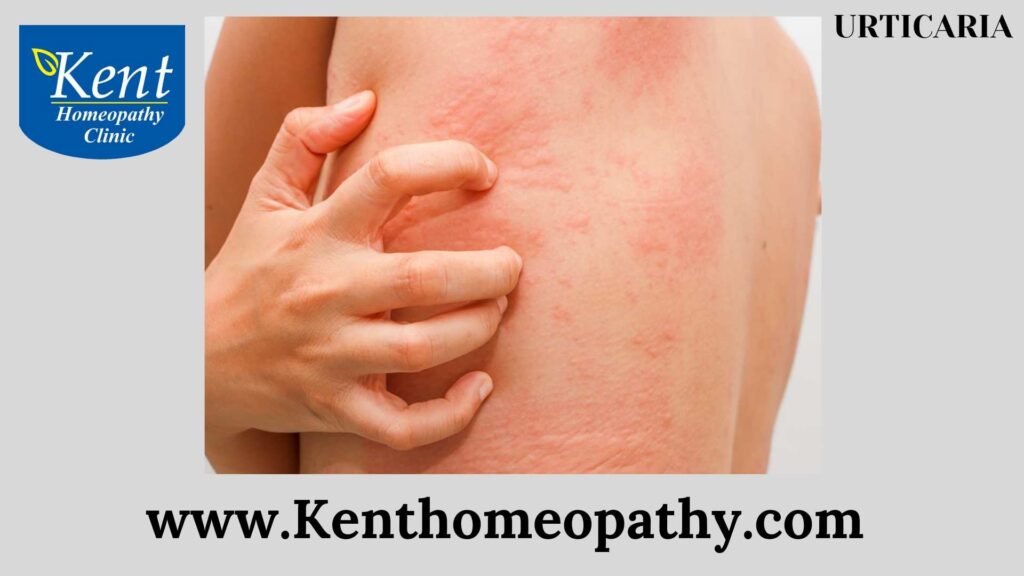Urticaria

Urticaria: Understanding Symptoms, Causes, and Types
Urticaria, commonly known as hives, is a skin condition characterized by the sudden appearance of itchy, raised welts on the skin. These welts, also known as wheals or hives, can vary in size and shape and often cause discomfort. Understanding the symptoms, causes, and types of urticaria is essential for effective management and relief.
Symptoms:
- Raised Welts (Hives):
– The hallmark symptom of urticaria is the sudden appearance of raised, red or skin-colored welts on the surface of the skin. These welts can be small or large and may merge to form larger areas of swelling.
- Itching (Pruritus):
– Urticaria is typically accompanied by intense itching, which can be bothersome and contribute to the overall discomfort experienced by individuals with hives.
- Redness and Swelling:
– The affected skin becomes red and swollen due to the inflammatory response triggered by the release of histamine.
- Blanching:
– When pressure is applied to the center of a hive, it often blanches or turns white. This characteristic helps differentiate urticaria from other skin conditions.
- Transient Nature:
– Urticaria is known for its transient nature. Individual hives usually last for a short duration before resolving, but new ones may continue to appear.
Causes:
- Allergic Reactions:
– Allergic reactions to certain foods, medications, insect stings, or latex can trigger urticaria. The body releases histamine in response to the allergen, leading to the characteristic welts and itching.
- Infections:
– Infections, especially viral or bacterial infections, can stimulate the immune system and contribute to the development of hives.
- Autoimmune Disorders:
– Autoimmune disorders, where the immune system mistakenly targets the body’s tissues, can lead to chronic urticaria in some individuals.
- Physical Stimuli (Physical Urticaria):
– Exposure to physical stimuli such as heat, cold, pressure, or sunlight can induce urticaria in susceptible individuals. This form is known as physical urticaria.
- Stress:
– Emotional stress can trigger or exacerbate urticaria. The release of stress hormones may contribute to the release of histamine.
- Medications:
– Some medications, including antibiotics, nonsteroidal anti-inflammatory drugs (NSAIDs), and certain blood pressure medications, can cause urticaria as a side effect.
- Genetic Factors:
– There may be a genetic predisposition to urticaria, as individuals with a family history of the condition may be more prone to developing hives.
Types:
- Acute Urticaria:
– Acute urticaria is characterized by the sudden onset of hives that resolve within a short period, typically lasting less than six weeks. It is often linked to allergic reactions, infections, or medication use.
- Chronic Urticaria:
– Chronic urticaria persists for more than six weeks and may last for months or even years. It can be associated with autoimmune factors, underlying medical conditions, or may have an unknown cause.
- Physical Urticaria:
– Physical urticaria is triggered by specific physical stimuli. Common types include:
– Dermatographism: Hives develop in response to scratching or pressure on the skin.
– Cold Urticaria: Exposure to cold temperatures induces hives.
– Cholinergic Urticaria: Triggered by an increase in body temperature, such as during exercise, stress, or hot showers.
– Solar Urticaria: Hives occur after exposure to sunlight.
- Contact Urticaria:
– Contact urticaria occurs when hives develop after direct skin contact with a specific substance, such as certain foods or chemicals.
- Aquagenic Urticaria:
– Aquagenic urticaria is a rare type where hives develop after contact with water, regardless of its temperature. This form of urticaria is exceptionally rare.
- Vibratory Urticaria:
– Vibratory urticaria is triggered by vibration or mechanical stimulation of the skin. Activities such as using a vibrating tool or riding a motorcycle can induce hives.
Contact to know more
Contact
Timings
Monday to Saturday:
11:00 AM to 02:30 PM
06:30 PM to 09:00 PM
